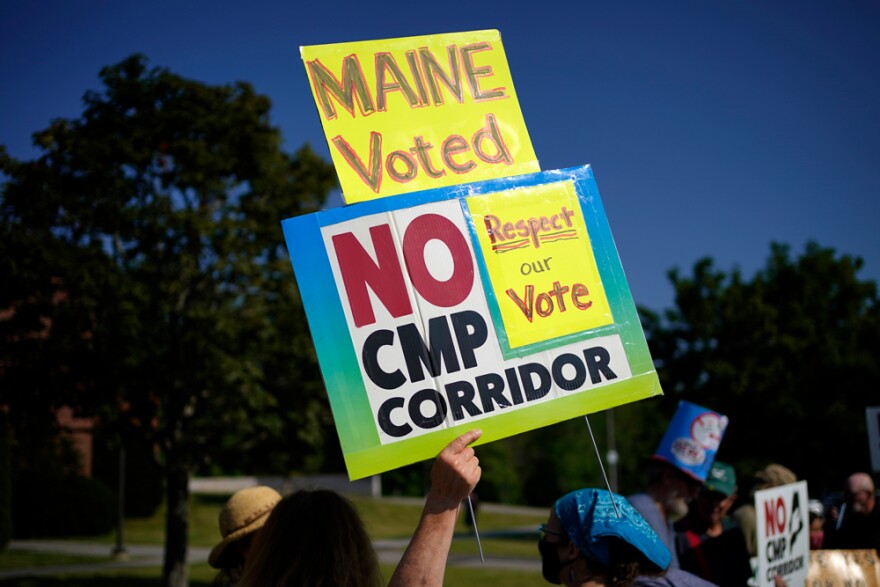A federal appeals court has agreed that Maine's voter-approved law dealing with foreign spending on elections is unconstitutional.
In November 2023, roughly 86% of voters supported a ballot initiative that sought to ban foreign governments from spending to influence candidate elections or referendums in Maine. The initiative was a response to the tens of millions of dollars that Central Maine Power and Hydro Quebec spent to defeat an earlier referendum trying to block a controversial power line project through western Maine.
CMP, Hydro Quebec and Versant Power challenged the law on constitutional grounds. In early 2024, a U.S. District Court judge blocked the state from enforcing the law.
And on Friday, two judges with First Circuit Court of Appeals agreed with that decision in separate but concurring opinions. They said the law would likely violate the campaign activity and, therefore, the free speech rights of U.S. corporations that have foreign shareholders.
"Maine has not shown that the act's curtailment of First Amendment rights in this way is necessary," wrote Justice Lara Montecalvo. "The prohibition is overly broad, silencing U.S. corporations based on the mere possibility that foreign
shareholders might try to influence its decisions on political speech, even where those foreign shareholders may be passive owners that exercise no influence or control over the corporation's political spending."
CMP is a subsidiary of the Spanish company Iberdrola whose shareholders have included Qatar's sovereign wealth fund. Hydro Quebec is owned by the province of Quebec. Versant Power, meanwhile, is wholly owned by Enmax, which is owned by the city of Calgary, Canada.
The case now goes back to the District Court for further consideration.
The law, as passed by voters, would have prohibited any campaign spending, contributions or electioneering communications by corporations and political action committees in which foreign governments or "foreign-government owned entities" controlled at least a 5% stake of shares or ownership.
In its appeal, the state argued that even at the 5% threshold, a shareholder could exert significant pressure on a company. But the appellate court agreed with the lower court and the plaintiffs that the 5% threshold seemed arbitrary and could result in 1st Amendment violations. The appellate judges refer repeatedly to the U.S. Supreme Court decision in Citizens United, which ruled that political spending by corporations or labor unions was constitutionally protected free speech.
In his concurring opinion, Justice Seth Aframe raised the question of how corporations or other entities would be able to navigate what he described as the overly vague definition of a "foreign government" in a complex world where armed groups, gangs or even religious sects control certain territories.
"If I am right, a company otherwise wishing to participate in a Maine election would likely abstain from political speech entirely -- especially given the criminal penalties that may attach from an inaccurate evaluation of the political situation in a faraway place at any given time," Aframe wrote.
Several media organizations in the state, including the Maine Association of Broadcasters and the Maine Press Association, had also opposed the law because it would have required media organizations to establish policies and procedures to ensure that they do not air paid communications from groups influenced by foreign governments.
Sen. Rick Bennett, an Oxford Republican who was a lead proponent of the November 2023 ballot initiative, said in a statement that the appeal's court ruling was "deeply disappointing."
"Mainers spoke with one voice: our elections should belong to us, not to corporations owned or influenced by foreign governments whose interests may not align with our own," said Bennett, who was also a vocal opponent of the CMP corridor project. "It is outrageous that, once again, moneyed interests — foreign ones, no less — can continue to dominate our political discourse, drown out local voices, and distort public policy to serve their own agendas. The court’s decision means that entities entirely owned by foreign governments can still spend millions to sway our elections, while Maine voters struggle to be heard."
Bennett recently announced that he is running for governor next year as an independent.
But an attorney for the Institute for Free Speech, an organization involved in campaign finance issues, cheered the ruling.
"The First Circuit sent a strong message that states cannot use trivial, remote, and vaguely defined 'foreign influence' over American corporations to make an end-run around Citizens United," Charles "Chip" Miller said in a statement.



